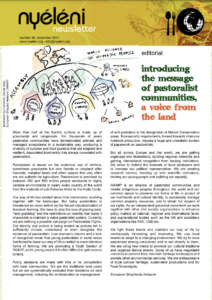
13/12/2021
Under: Asia/World, Food Sovereignty and Agroecology
Editorial
Introducing the message of pastoralist communities, a voice from the land
Illustration by Fernando Garcia Dory, European Shepard Network / WAMIP
More than half of the Earth’s surface is made up of grasslands and rangelands. For thousands of years pastoralist communities have domesticated animals and managed ecosystems in a sustainable way, producing a diversity of cultures and food systems that are adapted and resilient. Associated biodiversity has always co-existed with pastoralism.
Pastoralism is based on the extensive use of territory, sometimes grasslands but also forests or cropland after harvests, marginal lands and other spaces that very often are not suitable for agriculture. Pastoralism is practised by between 200 and 500 million people worldwide in highly variable environments in nearly every country of the world from the drylands of sub-Saharan Africa to the Arctic Circle.
Our way of life has existed since time immemorial, evolving together with the landscape. But today pastoralism is threatened as never before by the forced industrialization of livestock farming. We have to stop the loss of grazing land, “land grabbing” and the restrictions on mobility that make it impossible to maintain a viable pastoralist system. Currently we are defining a possible campaign on Pastoralists Rights. Our identity and culture is being eroded as policies fail to sufficiently include, understand or even recognize the existence of pastoralism. Low economic returns and a lack of recognition mean that young pastoralists in some areas feel forced to leave our way of life or switch to more intensive forms of farming. We are promoting a Youth Section of WAMIP, as for young people it is often difficult to gain access to land.
Policy decisions are made with little or no consultation with local communities. We are the traditional land users but we are systematically excluded from decisions on land management, including the reintroduction or management of wild predators or the designation of Nature Conservation areas. Bureaucratic requirements, biased towards intensive livestock production, impose a huge and unrealistic burden of paperwork on pastoralists.
But all across Europe and the world, we are getting organized into federations, building regional networks and gaining international recognition from leading institutions. We strive to defend the interests of local producers and to increase our political representation. We are creating research centres, teaming up with scientific institutions, training our young people and building our capacity.
WAMIP is an alliance of pastoralist communities and mobile indigenous peoples throughout the world and our common space to preserve our forms of life in pursuit of our livelihoods and cultural identity, to sustainably manage common property resources, and to obtain full respect of our rights. As an independent grassroot movement we work together with other civil society organisations to influence policy makers at national, regional and international level, and supranational bodies such as the UN and subsidiary organisations like FAO, CBD etc.
We fight these trends and maintain our way of life by continuously innovating and improving. We use local breeds to adapt to a changing environment. We try to raise awareness among consumers and to sell directly to them. We are using new media to promote our cultural traditions and organize festive events. Some of us have negotiated contracts to prevent fires, maintain heritage landscapes and provide other environmental services. We are ambassadors of local cultural heritage, sustainable productions and for Food Sovereignty.
European Shepherds Network
Download / view the Nyéléni newsletter no 46 here :
Introducing the message of pastoralist communities, a voice from the land





